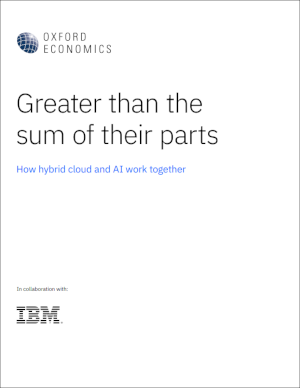Ungated Post | 01 Dec 2020
Greater than the sum of their parts: How hybrid cloud and AI work together

Cloud and AI adoption have seen significant growth over the past year as executives increasingly focus on strategic imperatives such as automating business processes, modernizing applications, and streamlining development. When implemented in concert—and supported by a strong data strategy—cloud and AI provide value that is greater than the sum of their parts.
Oxford Economics and IBM surveyed 6,000 CIOs, CTOs, and senior IT leaders from organizations that are using cloud services in some capacity and at least experimenting with AI. Our analysis of the survey data, which covered six industries and 26 countries, shows that data strategies, AI and cloud—especially hybrid cloud—are increasingly effective and intertwined.
Our Thought Leadership team produces original, evidence-based research made accessible to decision-makers and opinion leaders.
Oxford Economics’ team is expert at applying advanced economic tools that provide valuable insights into today’s most pressing business, financial, and policy issues.
Related Services

Post
KPMG M&A Outlook 2026: Between Uncertainty, Resilience, and Seizing Opportunities
Discover how Germany’s M&A landscape is evolving – with a focus on growth, AI and post-merger value creation.
Find Out More
Post
Silver, the next generation metal
This report highlights the critical role silver plays in data centres and artificial intelligence (AI), automotive and electric vehicles (EVs), and solar energy photovoltaics (PVs). With these sectors expected to expand significantly over the coming years, we expect future silver demand to be strong.
Find Out More
Post
Powering the UK Data Boom: The Nuclear Solution to the UK’s Data Centre Energy Crunch
The UK’s data centre sector is expanding rapidly as digitalisation, cloud computing, and artificial intelligence (AI) drive surging demand for high-performance computing infrastructure.
Find Out More